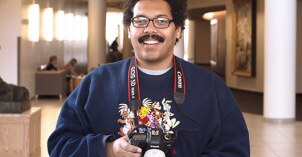
What is Organizational Leadership?
Strategic organizational communication students also make competitive applicants for graduate programs in law, public administration, public policy, human resource management, nonprofit management, and many other fields.
- Learn to become exceptional leaders within various types of organizations.
- Learn to become excellent communicators who know how to work well independently or on teams.
- Learn to articulate messages that engage the public.
- Learn how to use diverse platforms to reach target audiences.
- Learn the skills necessary to become proficient mediators and advocates in the professional world.
Highlighted Career Paths
Graduates with a degree in Organizational Leadership have a wide array of rewarding careers before them. Check out some of the top careers students get with this degree or explore more career options in I-Plan.
Community Outreach Manager
Community outreach managers build relationships with organizations and engage in community activities. They maintain clear records of participants, partners, and donors. Managers also establish communication between their organization, partner organizations, and community members.
Director of Stakeholder Engagement
Directors are leaders within their organization and cultivate important relationships inside and outside of their organization. They manage and build effective, motivated teams and articulate a vision and purpose to stakeholders.
Governmental Office Director/Chief of Staff
In this career, professionals analyze complex interdisciplinary issues, track stakeholder and public opinion, and make recommendations for action. They also develop and implement policies and procedures, and participate in community management and social change.
Highlighted Courses
Develop essential leadership skills through courses in organizational strategy, team dynamics, persuasive communication, conflict resolution, and more.
Meet Our Faculty
Learn from experienced faculty who bring years of industry expertise, academic excellence, and a commitment to developing future organizational leaders.
Degree Emphases
As part of earning a Bachelor of Science in Communications students will choose two different emphases from the following list, empowering them to become successful in different aspects of communication.









